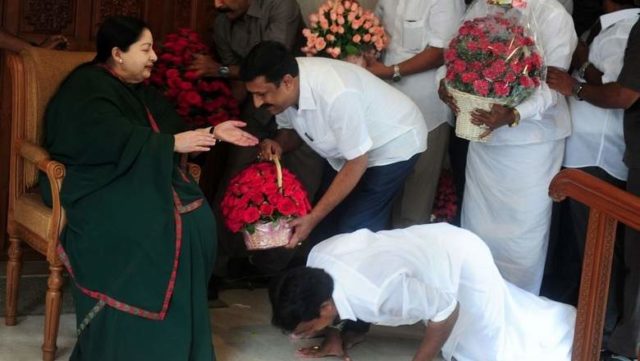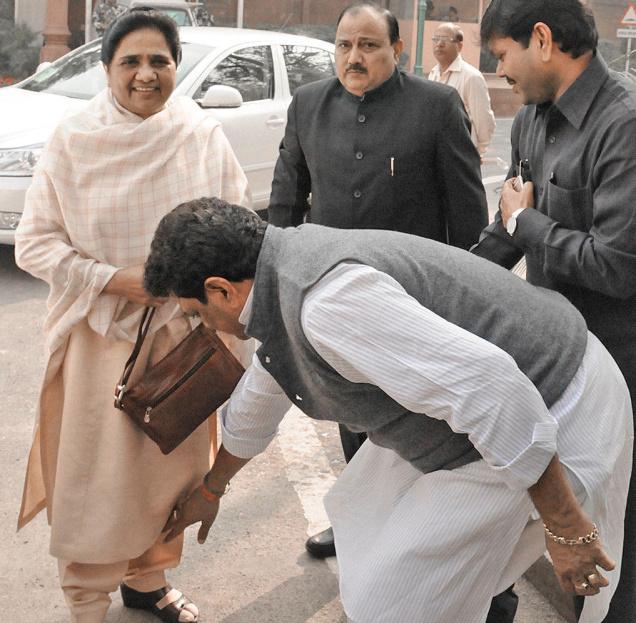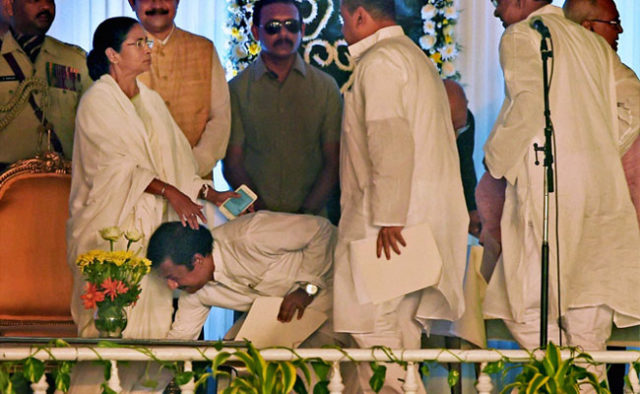A ‘sycophant’ is defined by the dictionary as someone who ‘acts obsequiously towards someone in power in order to gain an advantage’. As dictionary-definitions go, this is one of the instances where the meaning is absolutely perfect. And for examples of sycophancy, we do not have to look much further than our own political and bureaucratic class.

The conclusion of the elections in Tamil Nadu recently was crowned by the cringe-inducing sight of senior bureaucrats in the TN secretariat congratulating the Chief Minister, Ms Jayalalitha, on her winning the elections. As they bowed lower and lower, these highly-educated men and women – officers who had passed some of India’s toughest exams – they exemplified what is wrong with our political societ: the tendency to treat the holders of power as feudal lords. For this is not a phenomenon restricted to Tamil Nadu and Ms Jayalalitha. Throughout the length and breadth of the country, politics has created a new ruling class, replacing or sometimes re-purposing, the erstwhile landholders, the zamindars, and making them masters of our destinies. So government officials, party rank-and-file, and even we, the people, are guilty of treating them not as our ‘elected representatives’, but as Lords and Ladies.

The Congress has it’s ‘ruling dynasty’, the Gandhi family. Regional parties are run by leaders like Nawabs of old: the Yadav family in Uttar Pradesh, whose only credible rival is the equally person-centric rule of Ms Mayawati. In West Bengal, Mamata Banerjee, humble appearance notwithstanding, is as much a Queen as the Victoria after whom Calcutta’s famous memorial is named. In Maharashra, the Thackeray writ runs unchallenged in the Shiv Sena, while Ms Jayalalitha and M. Karunanidhi run their respective parties with an iron fist. In all these instances we see the same tendency – to equate power with the person holding it, and to submit wholly and shamelessly to it. So even the worst political defeats will not see the authority or policies of the Gandhis challenged. The hubris and megalomania that both the Yadavs and Mayawati display affects their support not a bit. Mamata Banerjee’s authoritarian ways are forgiven even by the otherwise rebellious people of West Bengal. Even the BJP, a party that traditionally had a history of robust internal democracy, appears to be transforming into a personality cult, a development that has dangerous implications for the party’s and the nation’s future.

The root of this behaviour is in the fact that India is only nominally a democracy. If we look at England, we look at a people who have fought inch by inch from the signing of the Magna Carta in 1215 to granting women the right to vote in 1918 – that is seven hundred years of struggle to earn the right to govern themselves. The United States, when it won freedom from England in 1775, could well have become a monarchy under George Washington, but the founding fathers of that country chose to be a democracy. In France, the bloodbath of the revolution forged a nation jealously protective of the rights of the people over the rights of the state.
But for too many Indians, the struggle to be free was fought by someone else on their behalf. In 1947, a country of nearly 350 million people who had always served a master was suddenly being asked to rule itself. To understand the mental dissonance this creates, let us remember that India as a unified nation had only existed for brief periods in history – first under Ashoka and then from the period beginning with Akbar’s rule and ending with Aurangzeb’s. For the rest, various different rulers each ruled most of India holding small-to-medium swathes of land. Moreover, regardless of who titled himself ‘Emperor of India’, power was wielded, for the peasant in the villages, by the local landowner. Unquestioned obedience to this landowner was as ingrained in the Indian psyche as his faith in God.
For such a people to be thrust into a position to actually become rulers of their own destiny was always going to be fraught with danger. In the event, India has survived, and our democracy is considered a ‘vibrant’ one; certainly, when compared to the mess in Pakistan or the tyranny in China, India appears to be in a much better place. But observe the signs – the demands of unquestioned loyalty from all parties, the level of political debate brought down to personal attacks and we see that the tendency is to revert to the days of feudalism. MP’s, MLA’s and even municipal corporators behave like ‘rulers’ rather than ‘representatives’ and for all the fancy talk about being a ‘servant’ of the people, Prime Ministers and Chief Ministers clearly expect to be treated like monarchs.
So political sycophancy is not new, but it is a disturbing manifestation of an ancient feudalism that has corroded the roots of our government and society. Until the people of India learn to stand up for themselves rather than genuflecting before those who they have themselves chosen, it is unlikely that this country will be a true democracy.































